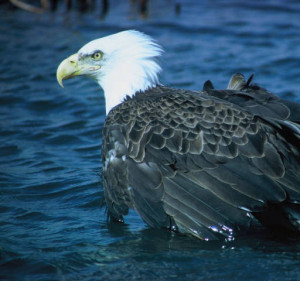 Today a bald eagle flew over the nature center, possibly one of the pair that nested just upstream from our preserve along the West Twin River. There are two eagle nests in the neighborhood nearby, neither one on Woodland Dunes property. We see bald eagles virtually every day here, and they scour the Lakeshore in search of the many things they eat. When I grew up here 50 years ago, we never saw them- I think the fist eagle I ever recorded was on a fishing trip to Canada when I was young. During those years they were being poisoned by insecticides, and their population numbers were crashing. Some people, like Rachel Carson, were vilified for pointing out the damage that was being done to wildlife. Finally it was decided that things needed to change, and people did change their behavior. Eagles received protection from DDT and their nesting sites, and their population began a steady recovery. Improved water quality and the positive impact of that on food sources for eagles is also cited as a factor. Now, it’s estimated that there are nearly 1500 nest sites in Wisconsin alone, and we commonly see eagles along the Lakeshore, although not many of them. It took some effort to change our behavior, but we gave back to eagles their existence. And a number of other birds as well.
Today a bald eagle flew over the nature center, possibly one of the pair that nested just upstream from our preserve along the West Twin River. There are two eagle nests in the neighborhood nearby, neither one on Woodland Dunes property. We see bald eagles virtually every day here, and they scour the Lakeshore in search of the many things they eat. When I grew up here 50 years ago, we never saw them- I think the fist eagle I ever recorded was on a fishing trip to Canada when I was young. During those years they were being poisoned by insecticides, and their population numbers were crashing. Some people, like Rachel Carson, were vilified for pointing out the damage that was being done to wildlife. Finally it was decided that things needed to change, and people did change their behavior. Eagles received protection from DDT and their nesting sites, and their population began a steady recovery. Improved water quality and the positive impact of that on food sources for eagles is also cited as a factor. Now, it’s estimated that there are nearly 1500 nest sites in Wisconsin alone, and we commonly see eagles along the Lakeshore, although not many of them. It took some effort to change our behavior, but we gave back to eagles their existence. And a number of other birds as well.
I’m not a Biblical scholar, nor is this a religious column, but I do know that the saying “it’s better to give than to receive” refers to Acts 20:35, and the concept seems to be very much accepted as truth. Our favorite people are those who share and are generous, and behaving that way makes us feel good about ourselves. And I think feeling good about ourselves truly is good for us if not crucial for our well-being, in addition to other blessings.
Giving and helping those who are in need, whether they are human or wild, goes beyond that. In both cases the improvement in our self-esteem is great, and helping people strengthens our community and gives us a better and safer place to live. Helping nature does that too, and more and more research supports the positive effects of being in healthy natural surroundings. Helping the natural world to retain its health in terms of its function and complexity (with many interacting species) helps improve the qualities people depend on too, like clean air , soil, and water. Not only do we take those in directly, but they impact the health of our food (look at the impacts of washing our food in contaminated water can have). Giving back to nature doesn’t require great sacrifice. It starts with behaviors as small as the act of planting a native tree or shrub that helps birds (or giving a loved one a gift certificate to a local nursery), or a milkweed to give a monarch caterpillar a home. A little patch of nature in the corner of a yard, a bird feeder or bath to draw the birds closer to us so they can be appreciated, a brush pile for small mammals, or a window treatment that reduces bird collisions with glass. Or keeping cats indoors where they are warm and safe and not eating native animals. Or perhaps giving a child a book about wildlife so that they can learn of and respect nature. Individually these things are small, but in sum they are great.
In the words of Aesop, “No act of kindness, however small, is ever wasted.” I think this is as true regarding nature as people. Here’s hoping that during this giving season, we remember to be kind to both.
